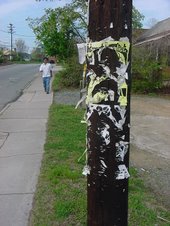
Just this spring, art appeared on telephone poles around town. Hand painted wooden signs were nailed to poles featuring "lost" animals - Mr. Jazzy, Killer, Sonny Boy, and Mr. Crazy. "A little guerrilla art in Chapel Hill," said Kate Flory, executive director of the Chapel Hill Public Arts Commission. "That's fun." Unfortunately, as the law now stands, IT'S ALSO ILLEGAL.
Local mom finds 'lost' art
Chapel Hill News
March 21, 2007
By Mark Schultz
Page 1
CHAPEL HILL -- Sandra Elliott has started collecting art.
But the Chapel Hill interior designer says she'll gladly put the art back where she found it if the artist wants her to.
Elliott was on Elliott Road about a month ago when she saw the first one: the word "Lost" and a crudely painted dog on a hand-sized piece of wood nailed to a utility pole.
Her son, Blake, yelled at her when she pried the piece of wood from the pole.
"Mom, you took the sign down," said Blake, 12. "What if somebody is trying to find their dog?"
"Well, there's no phone number," she replied. "And I don't think any dog looks like this."
The dog on the wooden board had five orange stripes down its back.
So far Elliott has collected four "Lost" signs looking for creatures named Mr. Crazy, Killer, Sonny Boy and Mr. Jazzy.
"I have not heard of this," said Kate Flory, executive director of the Chapel Hill Public Arts Commission. "A little guerilla art in Chapel Hill. That's fun."
In addition to Elliott Road, Elliott said she has found the signs on South Lakeshore Drive, old Erwin Road and Old Chapel Hill Road.
"It's become our hunt," Elliott said of her turns driving in Blake's school carpool.
But she doesn't want to keep the art if its creator didn't intend for people to take it.
"I'm enjoying this, but I don't want to look like I'm going around stealing things," she said.


